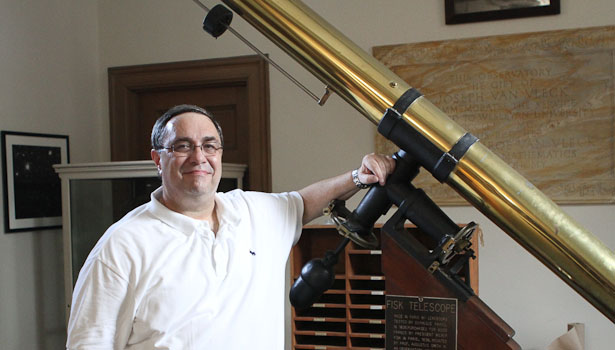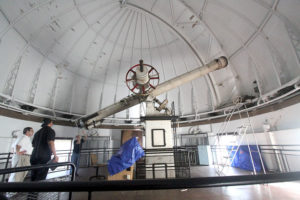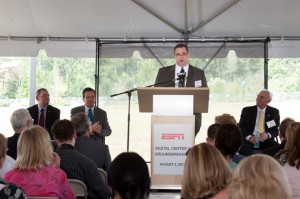Sidelines: Chuck Pagano, stargazer

As a sports fan, Chuck Pagano probably could tell you all about “The Big Dipper” who also was known as basketball great Wilt Chamberlain.
But Pagano — one of ESPN’s first employees in 1979 — also is obsessed with astronomy, so he can regale you with insights into the constellation of stars dubbed The Big Dipper.
“I’m a product of John Kennedy and the Space Race. That’s what really got my attention on the stars, the universe and the solar system,” said Pagano, who built his first telescope when he was a 16-year-old science buff.
His ability to process concepts that would give most of us Excedrin headaches is one reason he became ESPN’s first Chief Technology Officer in August 2011.
In that role he oversees all the technology sectors within ESPN on all platforms — and he has duties that dovetail with the parent Walt Disney Company’s needs, too.
From his top floor Building 13 office in Bristol, Pagano literally oversees construction of Digital Center 2 (DC2). By 2014, the sister to the Digital Center across the street will be the new home of SportsCenter‘s studios, among many other things.
“I lucked out [with this office location],” he said. “But the way my brain works, I’m looking at [DC2’s construction] like a time-lapse exercise. Everything’s a snapshot.”
He’s been dedicated to ESPN’s growth from the very beginning, joining the company even before its Sept. 7, 1979 on-air debut and helping to construct the Los Angeles Production Center some 30 years later.
Despite his day-to-day duties, there’s a bigger picture that consumes Pagano: space.

“I have a love of engineering and a love for discovering stuff,” he said.
His direction of ESPN’s technology sectors since 1999 has resulted in numerous citations for the company as being among the most innovative in the nation.
But “I live my life in preparation for when I do retire at some point, I get some property with some dark skies,” said Pagano, who said he still lives in the Waterbury, Conn. home he grew up in.
Under “dark skies” — an atmosphere free of light pollution — he hopes to construct “the Pagano Observatory.”
He might find the right remote property in New England, but he also has his sights set on deserts in South America.
These days, however, he’s in the midst of astronomy studies at Wesleyan University in Middletown, Conn., in the school’s Graduate Liberal Studies Program.
Pagano’s “the kind of student that the program loves to have,” said William Herbst, in his 31st year at Wesleyan and the school’s John Monroe Van Vleck Professor of Astronomy.
“He’s a hobbyist, too, but he’s seriously into it.”
Pagano’s construction of a telescope — “a 16-inch reflector” — foreshadowed his venture into the virginal world of satellite television — and ESPN — in the late 1970s.
With a telescope “you’re gathering light into a dish, so it’s sort of bellowed out so it’s like a satellite dish. That’s what a satellite dish does, it brings the energy down, and it focuses it into one spot,” he explains.
Working as a technician for CBS’ Hartford, Conn. affiliate from 1977-79, Pagano seemed to be on a safe and secure career path.
His decision to join ESPN in August 1979 did not set well with his father, Pagano recalled.
“I still have the dents in the back of my head from my father when he kicked me asking ‘You’re going where?’ said Pagano, who owns a B.S. degree in electrical engineering and an M.S. in organizational psychology from the University of Hartford.

“I was leaving Channel 3 in Hartford. It was owned by Washington Post-Newsweek, and it was a CBS or ‘Tiffany’ network.”
But ESPN offered a chance to be a pioneer, as he served as one of the fledgling network’s three TDs — or Technical Directors — even though he was still in his mid 20s.
It also offered a shorter commute from his Waterbury home.
“We were the ultimate startup,” Pagano recalls.
“The cable got cut connecting us to the local cable system, who had the antennas next door to us. Or somebody would turn ‘this’ off because they thought we off the air, so turn it off.”
“Nobody else was doing sports 24 hours a day [beginning September 1980]. It was part of this grand experiment to see if this thought concept by [ESPN founder] Bill Rasmussen was going to fly.
“It did.”
Note: Speaking of Chuck Pagano, the Rasmussen Tapes are done.
Pagano took part in a conversation with ESPN’s Founder Bill Rasmussen this past spring during which he, Bill and fellow ESPN pioneer Bill Lamb reminisced about the very early days of the company and answered questions from six employees who weren’t yet born when ESPN went on the air: Brent Colborne, Melissa Fazzio, Joshua Gamage, Victoria Vaynberg, Rachel Nance and Matthew Hutvagne.
You can check them out on our YouTube channel.







